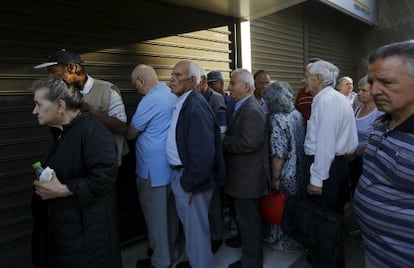Stock market loses ground on Greek news while Rajoy calls urgent meeting
Economy minister says Spain safe against potential fallout from the debt crisis in Greece

The Spanish stock market reacted negatively to the first day of cash controls in Greece, with the blue-chip Ibex 35 immediately yielding 5.6 percent from closing time on Friday.
Over the first half hour of trading, the benchmark index in the Madrid exchange rallied back slightly, reducing the drop to 4.55 percent.
Greek Prime Minister Alexis Tsipras announced on Sunday night that Greek banks would be closed all week. On Friday, talks between Greece and its European Union partners broke down after Tsipras announced that his government would hold a referendum on July 5 so voters could decide on the bailout terms.
Fortunately, Spain’s best firewall is what it has already done”
Economy Minister Luis de Guindos
Cash withdrawals from automatic tellers were limited to €60 per day on Monday.
The jolt to the Spanish market mirrored reactions elsewhere in Europe, where the German DAX registered a drop of 4.2 percent, the French CAC slid 4.20 percent and Milan’s FTSE Mib gave up 4.8 percent. In Britain, which is not part of the euro zone, the FTSE 100 posted the smallest losses, around two percent.
The Greek crisis also affected risk premiums in Europe’s peripheral countries. The gap between Spanish and German 10-year borrowing costs soared to 185 basis points, compared with 118 when trading ended on Friday.
Emergency meetings
Meanwhile, European leaders in all the main capitals were holding emergency meetings on Monday to discuss how events in Greece might affect national economies, and what steps to take.
In Spain, Prime Minister Mariano Rajoy of the Popular Party (PP) called a meeting of the Delegate Committee for Economic Affairs in order to analyze the Greek situation after the lack of agreement with creditors, according to sources at La Moncloa, the seat of government.
Deputy Prime Minister Soraya Sáenz de Santamaría and Economy Minister Luis de Guindos appeared in a joint press conference on Monday shortly before noon to send out a reassuring message about the Spanish economy and the strength of its banking sector.
“In terms of creating a firewall against extraordinary external events like the Greek situation, whatever measures haven’t been put in place already would be difficult to put in place now,” said De Guindos.
“Fortunately, Spain’s best firewall is what it has already done, such as bolstering its banking sector, reducing its public deficit and posting growth in exports, which ‛seals’ the Spanish economy against the kind of ‛corralito’ in place in Greece,” he added, using the term popularized in Argentina in 2001 to describe the freeze on bank accounts.
“This is a very delicate moment for the future of the euro,” the minister admitted. “I am convinced that Greece will ultimately remain in the union, but from the Spanish point of view, we had never been so well prepared for this situation as we are now.”
Tu suscripción se está usando en otro dispositivo
¿Quieres añadir otro usuario a tu suscripción?
Si continúas leyendo en este dispositivo, no se podrá leer en el otro.
FlechaTu suscripción se está usando en otro dispositivo y solo puedes acceder a EL PAÍS desde un dispositivo a la vez.
Si quieres compartir tu cuenta, cambia tu suscripción a la modalidad Premium, así podrás añadir otro usuario. Cada uno accederá con su propia cuenta de email, lo que os permitirá personalizar vuestra experiencia en EL PAÍS.
¿Tienes una suscripción de empresa? Accede aquí para contratar más cuentas.
En el caso de no saber quién está usando tu cuenta, te recomendamos cambiar tu contraseña aquí.
Si decides continuar compartiendo tu cuenta, este mensaje se mostrará en tu dispositivo y en el de la otra persona que está usando tu cuenta de forma indefinida, afectando a tu experiencia de lectura. Puedes consultar aquí los términos y condiciones de la suscripción digital.









































